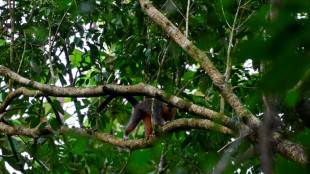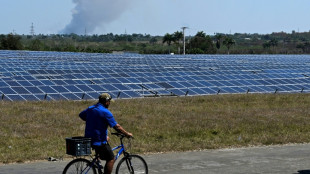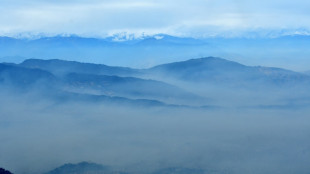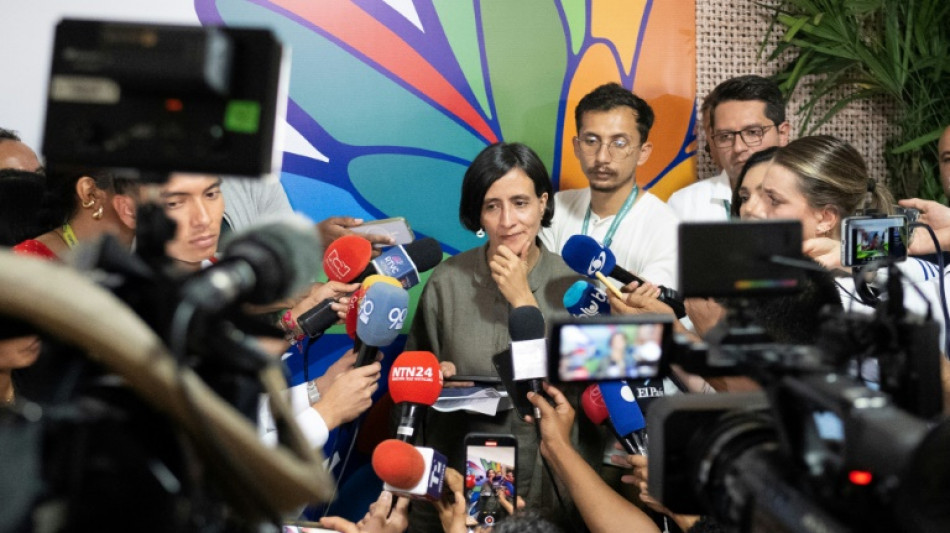
-
 US soybeans, energy: Who is hit by China's tariff retaliation?
US soybeans, energy: Who is hit by China's tariff retaliation?
-
Green, Sengun lift Rockets over Thunder, Celtics clinch record

-
 Ariya downs defending champ Korda to advance at LPGA Match Play
Ariya downs defending champ Korda to advance at LPGA Match Play
-
Ovechkin ties Gretzky's all-time record of 894 NHL goals

-
 Under-pressure Doohan vows to learn from Japanese GP smash
Under-pressure Doohan vows to learn from Japanese GP smash
-
Harman goes four clear at Texas Open

-
 McLaughlin-Levrone, Thomas cruise to wins at opening Grand Slam Track
McLaughlin-Levrone, Thomas cruise to wins at opening Grand Slam Track
-
Russian strike kills 18 in Ukrainian president's home city

-
 US cardinal defrocked for sex abuse dies at 94
US cardinal defrocked for sex abuse dies at 94
-
Lula admits 'still a lot to do' for Indigenous Brazilians
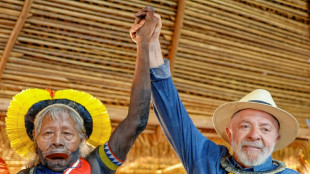
-
 England, Germany and Spain on mark in women's Nations League
England, Germany and Spain on mark in women's Nations League
-
Bayern's Musiala to miss Inter first leg with injury

-
 Judge orders return to US of Salvadoran man deported in error
Judge orders return to US of Salvadoran man deported in error
-
'Class' Freeman eases Northampton past Clermont and into Champions Cup quarters

-
 Amadou of Malian blind music duo dies aged 70
Amadou of Malian blind music duo dies aged 70
-
Freeman hat-trick eases Northampton into Champions Cup quarters with Clermont win

-
 Defiant Trump dismisses stock market's tariff plunge
Defiant Trump dismisses stock market's tariff plunge
-
Musiala injury sours Bayern win at Augsburg

-
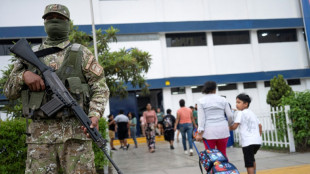 Peruvian schoolkids living in fear of extortion gangs
Peruvian schoolkids living in fear of extortion gangs
-
Top seed Pegula rallies to oust defending champ Collins in Charleston

-
 Amadou of Malian blind music duo Amadou & Mariam dies aged 70
Amadou of Malian blind music duo Amadou & Mariam dies aged 70
-
California to defy Trump's tariffs to allay global trade fears

-
 Bayern's Musiala subbed off with injury days out from Inter clash
Bayern's Musiala subbed off with injury days out from Inter clash
-
Russian strike kills 16 in Ukraine leader's home city, children among dead

-
 NBA fines Grizzlies' Morant for imaginary gun gesture
NBA fines Grizzlies' Morant for imaginary gun gesture
-
Trump tariffs offer opportunity for China

-
 UK comedian Russell Brand charged with rape
UK comedian Russell Brand charged with rape
-
Marsh, Markram help Lucknow edge Mumbai in IPL

-
 Trump gives TikTok extra 75 days to find buyer
Trump gives TikTok extra 75 days to find buyer
-
Israel attorney general accuses PM of 'conflict of interest' in security chief dismissal

-
 Emery glad to see Rashford make landmark appearance
Emery glad to see Rashford make landmark appearance
-
Sean 'Diddy' Combs faces more charges ahead of criminal trial

-
 Russian missile strike kills 14 in Ukraine leader's home city
Russian missile strike kills 14 in Ukraine leader's home city
-
Trump's tariff Big Bang puts global economy under threat

-
 I Am Maximus backed for National as Mullins hot streak continues
I Am Maximus backed for National as Mullins hot streak continues
-
2014 World Cup winner Hummels to retire at season's end

-
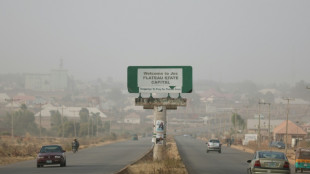 Intercommunal violence kills dozens in central Nigeria
Intercommunal violence kills dozens in central Nigeria
-
Nigerian, S. African music saw 'extraordinary growth' in 2024: Spotify

-
 Russell Brand: From Hollywood star to rape suspect
Russell Brand: From Hollywood star to rape suspect
-
France soccer star Mbappe unveiled in London... in waxwork form

-
 Trump goads China as global trade war escalates
Trump goads China as global trade war escalates
-
Israel expands Gaza ground offensive, hits Hamas in Lebanon
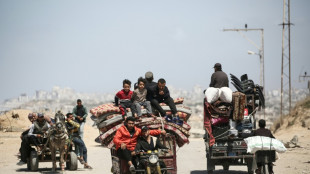
-
 TikTok faces new US deadline to ditch Chinese owner
TikTok faces new US deadline to ditch Chinese owner
-
US Fed Chair warns tariffs will likely raise inflation, cool growth

-
 Mbappe among three Real Madrid players fined for 'indecent conduct'
Mbappe among three Real Madrid players fined for 'indecent conduct'
-
How can the EU respond to Trump tariffs?

-
 Canada loses jobs for first time in 3 years as US tariffs bite
Canada loses jobs for first time in 3 years as US tariffs bite
-
Real Madrid and Barcelona respect each other, says Ancelotti

-
 Nations divided ahead of decisive week for shipping emissions
Nations divided ahead of decisive week for shipping emissions
-
Trump goads China after Beijing retaliates in global trade war

| RBGPF | 100% | 69.02 | $ | |
| GSK | -6.79% | 36.53 | $ | |
| NGG | -5.25% | 65.93 | $ | |
| AZN | -7.98% | 68.46 | $ | |
| RYCEF | -18.79% | 8.25 | $ | |
| SCS | -0.56% | 10.68 | $ | |
| RELX | -6.81% | 48.16 | $ | |
| CMSC | 0.13% | 22.29 | $ | |
| CMSD | 0.7% | 22.83 | $ | |
| RIO | -6.88% | 54.67 | $ | |
| BTI | -5.17% | 39.86 | $ | |
| JRI | -7.19% | 11.96 | $ | |
| BCC | 0.85% | 95.44 | $ | |
| VOD | -10.24% | 8.5 | $ | |
| BCE | 0.22% | 22.71 | $ | |
| BP | -10.43% | 28.38 | $ |

UN talks on saving nature stumble on finance hurdle
The world's biggest nature conservation conference closed in Colombia on Saturday with no agreement on a roadmap to ramp up funding for species protection.
The 16th Conference of Parties (COP16) to the UN's Convention on Biological Diversity (CBD) was suspended by its president Susana Muhamad as negotiations ran almost 12 hours longer than planned and delegates started leaving to catch flights.
The exodus left the summit without a quorum for decision-making, but CBD spokesman David Ainsworth told AFP it will resume at a later date to consider outstanding issues.
The conference, the biggest meeting of its kind yet, with around 23,000 registered delegates, was tasked with assessing, and ramping up, progress toward an agreement reached in Canada two years ago to halt humankind's rapacious destruction of nature's bounty.
The Kunming-Montreal Global Biodiversity Framework that emerged from that meeting had set 23 targets to be met in just over five years from now.
They include placing 30 percent of land and sea areas under protection and 30 percent of degraded ecosystems under restoration by 2030, reducing pollution, and phasing out agricultural and other subsidies harmful to nature.
The Canada summit had also agreed that $200 billion per year be made available to protect biodiversity by 2030, including the transfer of $30 billion per year from rich to poor nations.
The actual total for 2022 was about $15 billion, according to the Organization for Economic Cooperation and Development (OECD).
On top of that, nations have pledged about $400 million to a Global Biodiversity Framework Fund (GBFF) created last year to meet the UN targets.
In Cali, negotiators were split largely between poor and rich country blocs as they haggled over increased funding and other commitments.
The biggest ask from the summit -- to lay out a detailed funding plan -- turned out to be a bridge too far.
Muhamad, Colombia's environment minister, had offered a draft text proposing the creation of a dedicated biodiversity fund, which was rejected by the European Union, Switzerland and Japan.
Developing nations had insisted on the creation of a dedicated biodiversity fund, saying they are not adequately represented in existing mechanisms including the GBFF, which they say are also too onerous.
- 'Clock is ticking' -
The meeting did manage to coalesce around the creation of a fund to share the profits of digitally sequenced genetic data taken from plants and animals with the communities they come from.
Such data, much of it from species found in poor countries, is notably used in medicines and cosmetics that can make their developers billions, very little of which ever trickles back down.
Delegates also approved the creation of a permanent body to represent the interests of Indigenous people under the UN's Convention on Biological Diversity.
Representatives of Indigenous peoples, many in traditional dress and headgear, broke out in cheers and chants as the agreement was gaveled through.
But the talks on biodiversity funding stumbled even as new research presented to coincide with COP16 showed that more than a quarter of assessed plants and animals are now at risk of extinction.
Only 17.6 percent of land and inland waters, and 8.4 percent of the ocean and coastal areas, are estimated to be protected and conserved.
UN chief Antonio Guterres, who had stopped over in Cali for two days with five heads of state and dozens of ministers to add impetus to the talks, reminded delegates that humanity has already altered three-quarters of Earth's land surface and two-thirds of its waters.
"The clock is ticking. The survival of our planet's biodiversity -- and our own survival -- are on the line," he said.
The meeting was held amid a massive security deployment following threats from a Colombian guerrilla group with its base of operations near Cali. No incidents were reported.
O.Johnson--AMWN
